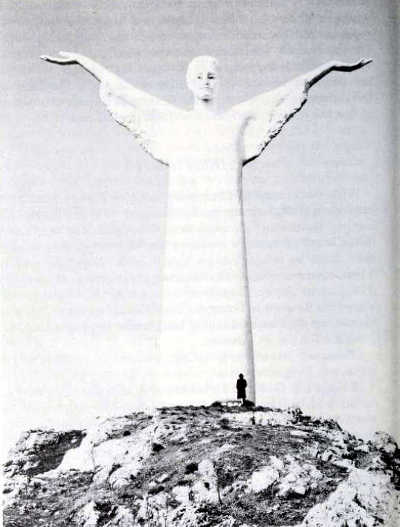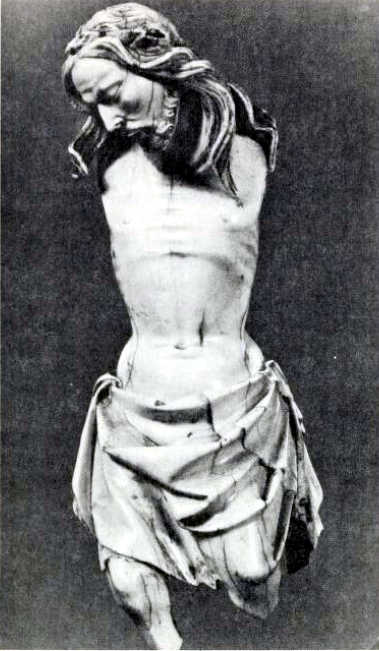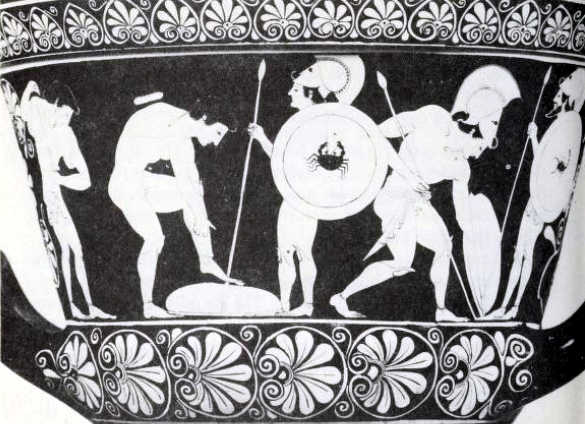
"Christianity transformed belief, an abstract creation of the mind, into a supreme virtue."

"A belief in absurdities which are contrary to the most obvious laws of nature. . . ."


"A belief in absurdities which are contrary to the most obvious laws of nature. . . ."
With the victory of Christianity most of Europe reverted to man-made infancy, protected by Almighty God the Father. The last two creations of the mind were: The Credo and the Church. The Church's reason for existence was "to compel men to salvation" . . . "to bring them to God," as St. Augustine claimed. These creations of the mind became a patrimony of humanity. The present Soviet Church with its Brezhnev doctrine which allows the Russians to "compel Czechoslovaks to salvation," is evidence that the human mind has been unable to produce any new guideline for human behavior.
Christianity transformed belief, an abstract creation of the mind, into a supreme virtue.
"I believe in God, the Father almighty, Creator of heaven and earth. And in Jesus Christ, His only Son, Our Lord, who was conceived by the Holy Ghost, born of the Virgin Mary, suffered under Pontius Pilate, was crucified, dead and buried: He descended into hell, the third day He rose again from the dead. He ascended into heaven, and sitteth at the right hand of God the Father almighty, from thence He shall come to judge the living and the dead. I believe in the Holy Ghost, the Holy Catholic Church, the Communion of Saints, the forgiveness of sins, the resurrection of the body, and life everlasting. Amen."
A belief in absurdities which are contrary to the most obvious laws of nature, is what the human mind achieved, and what is more, became proud of. Belief has become a part of humanity, the opium of the people. What changes occasionally is the object of the belief - the absurdity.
There have been several revolutions trying, in the name of the rational, to liberate humanity from beliefs. These revolutions have ended consistently either with an intensification of the belief, or with a change of the object of the belief. The Renaissance reinforced Christianity through Protestantism and Counter-Reformation. Rationalism of the seventeenth century merged into the Romanticism of the eighteenth century which brought the human mind to a degree of exaltation and poetic illusions never seen before in history. The scientific revolution of the nineteenth century produced "scientific socialism," a contradiction in terms.
The French Revolution produced Napoleon, and Napoleon, after having played like a naughty boy with the world, finished by saying: "La politique est la fatalité." No one mocked humanity better than Victor Hugo when, after the Battle of Waterloo, he wrote: "If it had not rained during the night of 17-18th June, 1815, the future of Europe would have been different. Napoleon was overthrown by a few drops of water." Something must be seriously wrong with a species whose whole life can be radically changed by a few drops of rain.
I would like to illustrate this point with a fictitious dialogue between the last Czar of Russia and Stalin when they met in heaven:
Czar: Tell me, how is life in Russia now? Is the almighty Father of all Russians still in the Kremlin?
Stalin: Yes.
Czar: Is there still only one belief dictated by the Kremlin?
Stalin: Yes.
Czar: Do you compel disbelievers to follow the official belief of the Kremlin?
Stalin: Yes.
Czar: Do you forbid the people to read anything that is not in accordance with the official state doctrines, as we did?
Stalin: Yes.
Czar: Do you send mad people like writers and intellectuals who dare to criticize in the name of reason the official belief, to Siberia or exile, as we did?
Stalin: Yes.
Czar: Do you still produce that wonderful vodka at 63 proof?
Stalin: No! We now have vodka at 65 proof.
Czar: Was the revolution really worth while for just two extra degrees of alcohol?
Among the main victims of belief were the Jewish people. For two thousand years they awaited their God to prepare Israel for them. After two thousand years they discovered the Roman Stoic advice, Dei facientes adiuvant, meaning that gods help those who help themselves.
Men continue to build their pattern of life on beliefs. In nature if anything has to be built it has to start from the earth, from reality, because of the law of gravity. The foundations of belief are never on earth, they are always in the clouds, in transcendentality. Any time humans build a belief, they do it upside down. It might be considered funny if it did not cost so many lives and such a lot of resources spent in vain.
Judging by man's readiness blindly and happily to follow absurd beliefs, one deduces that the peculiarity of human males is that they love to suffer, that they love to complicate each other's lives. The religious and political leaders, knowing this, treat humanity in the only way they really like to be treated - with disdain. The religious and political leaders, in order to be successful, learned how to treat people from that successful politico-religious leader Cardinal Richelieu. In his Testament Politique (1642) the Cardinal gave the following message:
"If the people were too comfortable it would be impossible to keep them within the rules of their duties. If they were free of tributes they would assume to be also free of obedience. One must compare people with mules, who, being accustomed to heavy loads, would be more easily spoilt by rest than by hard work."

Disclaimer - Copyright - Contact
Online: buildfreedom.org | terrorcrat.com / terroristbureaucrat.com